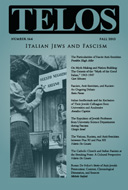Telos 164 (Summer 2013) is now available for purchase in our store.
 When we examine European anti-Semitism during the 1930s, and especially the Shoah, the case of Germany looms so large that the Nazi regime immediately appears as the paradigmatic form of fascism and the manifold policies directed against European Jewry during the 1930s little more than German racial policy writ large. Without in any way trivializing or, worse, relativizing in an ethical sense the German case, one might nevertheless suggest that it occupies too much conceptual space and occludes a more precise comparative understanding of other European cases where anti-Semitic policies had been autonomously generated, relatively independent of direct Nazi pressure. In this sense, decentering the German case might be a necessary first step toward a less encumbered perspective on what happened elsewhere.
When we examine European anti-Semitism during the 1930s, and especially the Shoah, the case of Germany looms so large that the Nazi regime immediately appears as the paradigmatic form of fascism and the manifold policies directed against European Jewry during the 1930s little more than German racial policy writ large. Without in any way trivializing or, worse, relativizing in an ethical sense the German case, one might nevertheless suggest that it occupies too much conceptual space and occludes a more precise comparative understanding of other European cases where anti-Semitic policies had been autonomously generated, relatively independent of direct Nazi pressure. In this sense, decentering the German case might be a necessary first step toward a less encumbered perspective on what happened elsewhere.


